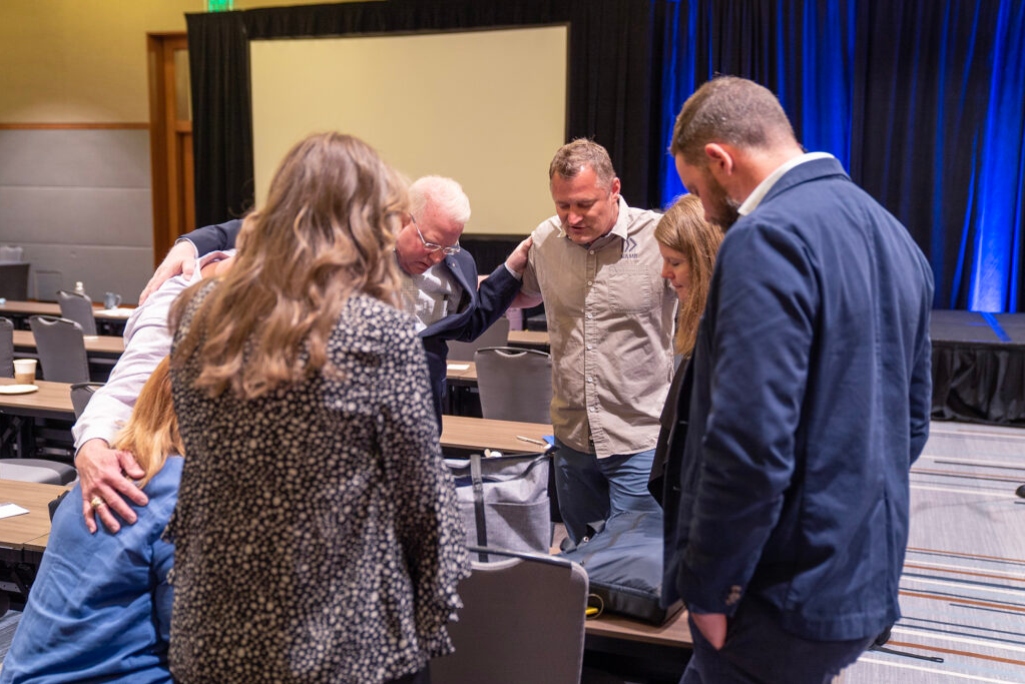
(Left to right) ERLC President Brent Leatherwood hosts a panel with Baptist state convention leaders Nathan Lorick (SBTC), Julio Guarneri (BGCT) and Randy Davis (TBMB) during an ERLC lunch event at the 2025 SBC annual meeting in Dallas. The leaders discussed how their conventions are partnering with the ERLC to defend churches’ biblical convictions, including filing amicus briefs in key 2025 U.S. Supreme Court cases.
DALLAS (BP) — The Ethics & Religious Liberty Commission (ERLC) hosted a conversation with Tennessee Attorney General Jonathan Skrmetti discussing the ongoing U.S. Supreme Court case in which he is the defendant on June 10 at the Southern Baptist Convention (SBC) annual meeting in Dallas.
ERLC President Brent Leatherwood led a conversation with Skrmetti, along with Alliance Defending Freedom Senior Vice President Ryan Bangert, discussing the monumental nature of the case and the potential effects of the upcoming decision on churches.
The decision in the consequential case, United States v. Skrmetti, will determine the constitutionality of a Tennessee law banning gender transition procedures for minors. Oral arguments were heard in December, and the High Court’s decision is expected this month.
“Southern Baptists have spoken strongly on this issue, which is why we are advocating here,” Leatherwood said during the lunch event.
Bangert explained how the radical gender ideology at the forefront of the case cuts across many different areas of society and could have a “direct and profound” impact upon religious liberty.
“This case before the Supreme Court really hits home on the most salient and obvious area where gender ideology hashes out in a negative way and that is directly injuring and damaging our children,” Bangert said. “From that perspective, the stakes in this case couldn’t be any higher.”
Bangert said the case has been a long time coming, and the groundwork has been laid for many years as Christians have pushed back on gender ideology in society.
The law in question in the case, Senate Bill 1 (S.B. 1), prevents health care providers from prescribing medication or performing procedures on minors in order to “transition” them to an identity opposite of their biological sex.
The legislation, passed in 2023, required doctors to cease all gender treatments on minors by March 31, 2024. Three transgender teenagers and the Biden administration then sued Tennessee officials in order to bar the state from enforcing the ban.
Currently, 26 states have a law similar to Tennessee’s that could be affected by the Supreme Court’s ruling.
The ERLC, in conjunction with the Tennessee Baptist Mission Board, previously filed an amicus brief in the case supporting the Tennessee law. The brief, filed last October, was one of 50 amicus briefs filed on the side of the defendants, while just over 30 amicus briefs were filed supporting the plaintiffs.
The conversation with Skrmetti and Banger was preceded by a panel discussion, moderated by Leatherwood, about Southern Baptist cooperation in this and other Supreme Court cases. The panel included Nathan Lorick, executive director of the Southern Baptists of Texas Convention; Julio Guarneri, executive director of the Baptist General Convention of Texas; and Randy Davis, executive director of the Tennessee Baptist Mission Board.
“I can tell you that when there is an issue that is being debated before their state legislatures, when these three brothers weigh in on that issue, it captures the attention of lawmakers,” Leatherwood said of the executive directors.
Skrmetti highlighted the crucial role that the ERLC’s brief plays in the case, as the entity was able to speak to the theological elements that the state of Tennessee could not officially address. He said Tennessee’s law and its subsequent defense are necessary measures to protect children in the face of confusing and harmful gender ideology.
“This is all about protecting kids,” Skrmetti said. “We are in the middle of a massive informational, ideological and theological era that is very confusing and complicated. Kids don’t understand the context that they’re in and the choices they are being asked to make. In a situation like that where there’s uncertainty and a huge amount of risk to children, the government absolutely has a job to do in order to protect kids.
“The Tennessee legislature and governor took a lot of heat for this. Yet, they were very brave and said, ‘We need to take action to protect our kids,’ and it’s been a privilege representing the state throughout this litigation.”
Skrmetti described being named as a defendant in such an important case as “super weird and awkward,” but said he is honored to serve in such an important role.
“When I was a young lawyer, I dreamed of arguing cases in the Supreme Court, but I never thought I would be the defendant in one,” he said.
“It was incredible to get to sit at the table in the Supreme Court for one of the most significant equal protection cases of the decade or even my lifetime. It’s why you go to law school. You go to law school because you want to make the world a better place, and I feel blessed to be in this position to lead the team fighting this fight.
“The fact that I’ve sort of been thrown into this situation is incredibly humbling,” Skrmetti said. “I am in the middle of things that are so much bigger than I have any business being in, but I believe I am there for a reason. I try to remember that this is not about me, and God puts people where He needs and wants them. I am here and I have a job to do, and I’m going to try to do it as best I can.”
(EDITOR’S NOTE — Timothy Cockes is news editor at New Orleans Baptist Theological Seminary.)


